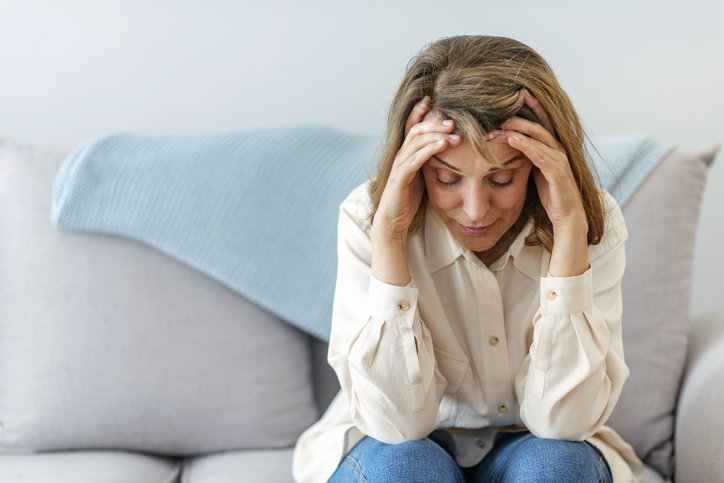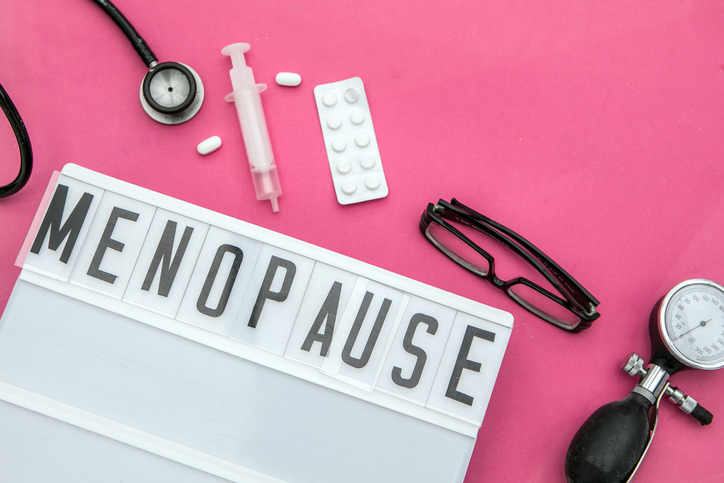Depression in Menopause is Common, But You Can Be Proactive

By Joy Stephenson-Laws, J.D.,Founder
Welsh media personality Carol Vorderman said she didn’t experience the common hot flashes when going through menopause, but her mood certainly changed (and not for the better).
“I had six months when I was really low. I'm not a depressed person but in that space of time I was genuinely depressed,” Vorderman said, according to one article.
“I was lower than I'd ever been in my life. It floored me – absolutely floored me. I was really surprised about that.”
With menopause, which marks the end of fertility for women, I think that along with hot flashes, women may expect other common side effects such as weight gain, sleep disturbances and hair loss. Depression, although common, may come as a shock.
“Even though studies have shown that some 40% of women experience depression as they go through menopause, more than a third of gynecologists don’t screen for it, a survey finds,” according to a recent report.
“While most of the gynecologists surveyed said they believed they could recognize depression in perimenopausal women, almost half did not feel confident in their ability to treat depressed patients, according to the report published in Menopause.”

This hole in healthcare specifically for menopause needs to be addressed, but if you are a woman going through “the transition” (menopause does not happen overnight, see the stages), it is very important to be proactive about preparing for and coping with depressive symptoms you may experience.
Why can this depression occur?
The simple answer is hormones.
“With the decrease in hormone production during menopause [the ovaries make less estrogen], women are more prone to a number of psychological problems, including depression, anxiety, irritability, nervousness, sadness, restlessness, memory problems, lack of confidence and concentration, and a loss of libido,” according to a recent Medical Xpress article that discusses a recent study which found evidence showing that depression affects as many as 70 percent of women transitioning into menopause.
“At the same time, as women age, the fear of death becomes more pronounced. Depression and anxiety, which are the most common psychological problems that occur during the menopause transition, likely increase that fear.”
Perception holds a lot of weight.So, I think it’s very important to note that some of this may be hormonal, but how you perceive things may also play a role. The average age an American woman goes through menopause is 51. This is certainly not old. And there are many proactive steps you can take to promote longevity.
Here are five things you can do to be proactive about menopause:
- Find support.
Whatever symptoms you may be experiencing during this transition, I guarantee another woman is going through it too. If you go online, there are all types of menopause support groups you can join. Community is key when it comes to health and wellness. And if you need to talk to a therapist, make this a priority.
- Eat healthily.
I cannot stress enough how critical it is to maintain a healthy, nutrient-dense diet to both prevent and manage depression. Eat plenty of fruits and vegetables and avoid ultra-processed foods.
- Maintain nutritional balance.
Eating healthy is great, however, it is not enough. Being nutritionally balanced means that we have the right balance of vitamins, minerals, water, protein, fats and carbohydrates in our bodies.
There are several minerals that are especially important during and after menopause. Either a deficit or surplus of them can impact how a woman experiences menopause and the effect it can have on her health in general. To learn what these specific minerals are and how you can be tested to see if you are balanced, read here.
- Exercise.
Moving your body is really one of the greatest ‘medicines.’ Think about it. I’m sure we can all relate to feeling down but then feeling a bit better once we go on a walk or run. One study even found that stretching before bedtime reduced menopausal and depressive symptoms.
- Avoid what I like to call the two ‘biggest no-nos.’
These are smoking and drinking alcohol excessively. I think the reasons behind this are pretty self-explanatory, but abusing your body by smoking and drinking excessively can lead to depression or make symptoms of depression more intense. Both drinking and smoking can contribute to hormonal imbalance, which women in menopause especially do not need. In addition to this, these unhealthy activities can deplete those critical nutrients from the body and promote inflammation (a known cause of depression).
Enjoy your healthy life!
The pH professional health care team includes recognized experts from a variety of health care and related disciplines, including physicians, attorneys, nutritionists, nurses and certified fitness instructors. This team also includes the members of the pH Medical Advisory Board, which constantly monitors all pH programs, products and services. To learn more about the pH Medical Advisory Board, click here.







